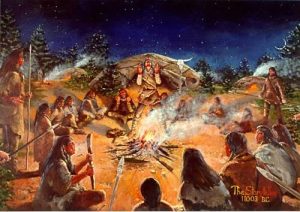
1] In his article, “Godzilla vs. Post-Colonial,” King discusses Robinson’s collection of stories. King explains that while the stories are written in English, “the patterns, metaphors, structures as well as the themes and characters come primarily from oral literature.” More than this, Robinson, he says “develops what we might want to call an oral syntax that defeats reader’s efforts to read the stories silently to themselves, a syntax that encourages readers to read aloud” and in so doing, “recreating at once the storyteller and the performance” (186). Read “Coyote Makes a Deal with King of England”, in Living by Stories. Read it silently, read it out loud, read it to a friend, and have a friend read it to you. See if you can discover how this oral syntax works to shape meaning for the story by shaping your reading and listening of the story. Write a blog about this reading/listening experience that provides references to the story.
After reading this story, I divided my answer to this question into 3 sections as it pertains to the impact that the ‘oral syntax‘ has on my comprehension of the meaning of the story. The three sections are as follows; the experiences of reading out loud, silent reading experiences and listening experiences.
The ‘reading out loud’ experience.
In relation to the concept of the oral syntax as discussed by King (186), my effort put forth in reading this story silently was minimal due to my increased understanding of the key concepts when I was reading this story out loud, which recreated a different interpretation through my expression of the story out loud which allowed me to engage in the role of the story teller. For example, when I read out loud the point that in order for First Nations to interpret the Indian laws, they must first learn how to read (79), the ‘performing’ aspect of actually talking about the importance of reading skills in order for the First Nation’s people to comprehend their own laws/rights shed light on the reality of the struggles that First Nations had to go through in abiding by laws that are implemented to regulate their position on their own land.
After reading out loud about the author’s narration of not having been to school (85), this point justified the unfamiliar English rhetoric that was used to describe the stories of Coyote’s journey to the king and Toh-Mah’s journey in delivering the books of Indian law’s throughout the country (80); for example, when Coyote is conveying the message to the cook that he wants to see the king, but uses the phrase “King, he’s here” (Robinson 69) which is written down as a statement but is implicitly interpreted by the reader that he is asking a question. This example positioned me in the perspective of the author by allowing me to vocally express the story from the authors perspective which verbally limited my English language expression because I was reciting his story word for word and allowed to me ‘experience’ a limitation in my oral expression that is a result of a lack of education in further developing the English language (85). Moreover, this yielded to a stronger understanding of the author’s Indigenous voice and position in the story in comparison to European settlers through oral narration.
The silent reading experience
As I was reading the story silently, I had questioned the author’s portrayal of Coyote in this story as an Indian because of the reference to the profound influence that god has on Coyote, for example when Robinson mentions how god sent Coyote an angel to go talk to the king of England to negotiate power relationships (67). I had questioned Coyote’s identity as a member of the First Nations after reading the article by Lutz because the author argued that Indigenous people did not worship a god (32), yet here is Coyote who has the power of invisibility as given by ‘god’ in his journey to communicate with the king of England (72), which made me wonder question if Coyote is Native, and if so, why he is communicating with a god after reading that Native people do not believe in a god.
The listening experience
My friend Ryan had read the story to me and while he was reading, I felt as if I was engaging in a discussion with him regarding the story in which I felt compelled to maintain a form of conversation in efforts to engage and fully comprehend the main points of the story through the concept of the oral syntax, which motivated my friend to directly communicate with me by re-telling the story as if he was experiencing it, which made my interpretation of the story hit closer to home due to his performance of telling the story (186). For example, I feel as if my friend was actually asking me the question of “Do you know what that angel was? Do you know?” (Robinson 66) which made me feel obligated to give a response because of his pause and eye contact with me; this example supports the oral syntax concept because the oral performance of my friend reading me the story engaged me to communicate with him which made it feel as if he was actually asking me on a personal level if I know what type of angel was sent to Coyote and why (186). The listening experience of hearing the angel sent from god to communicate with Coyote (66) created a visual in my head which allowed me to focus on the visual experience of interpreting the reading and allowed for a better understanding through oral communication, opposed to reading it in my head silently.
Works Cited
Hanson, Erin. “Oral Traditions.” IndigenousFoundations.Arts.UBC.Ca. First Nations and Indigenous Studies, 2009. Web. 21 June 2016.
King, Thomas. “Godzilla vs. Post-Colonial.” Unhomely States: Theorizing English-Canadian Postcolonialism. Mississauga, ON: Broadview, 2004. 183- 190.
Lutz, John. “First Contact as a Spiritual Performance: Encounters on the North American West Coast.” Myth and Memory: Rethinking Stories of Indigenous-European Contact. Ed. Lutz. Vancouver: UBC Press, 2007. 30-45. Print.
Robinson, Harry. “Coyote Makes A Deal With The King Of England.” Living By Stories. Ed. Wendy Wickwire. Vancouver: Talon, 2005. 64-85. Print.
“Storytelling.” First Nations Pedagogy. First Nations Pedagogy Online, 2009. Web. 21 June 2016.
Story Telling. N.d. Native Americans Online. Spiritalk Gathering. Web. 21 June 2016.

Hey Deepak,
I enjoyed your post. It sounds like the different reading formats had significant influences on how the story affected you. I’m particularly interested in the distinction between telling the story and listening to the story. From my reading of your blog (please correct me if I’m wrong) it seems that you were an active participant in the story both when you were telling it and when you were listening to it.
I’m wondering whether you felt more power over the story as the teller or the listener? Power as in the ability to alter the interpretation and the meaning that is taken from it. I ask because earlier in this course I seem to remember one of the authors we read saying that the true power over a story lies with the listener, and Im curious whether you found this to be true.
Cam
Hey Cam,
As it pertains to your question about the concept of ‘power’, I felt that my ability to alter the interpretation and meaning was most effective in the form of someone telling me the story. Being told the story influenced by perception because it allowed me to explore the every characteristic of the story in away that was contrary to me just reading the story in my head. Thank you for taking the time out and reading my blog.
Deepak